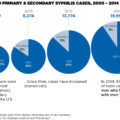Which sexually transmitted infection (STI) can be successfully treated with antibiotics?
A- human papilloma virus (HPV)
B- syphilis
C- hepatitis C
D- genital herpes
The correct answer to the question above is B- syphilis. According to WHO, More than 1 million sexually transmitted infections (STIs) are acquired every day worldwide. STIs present a major burden of disease and negatively affect people’s well-being across the globe. Chlamydia, gonorrhea, and syphilis are three STIs that are all caused by bacteria and can potentially be cured by antibiotics. Unfortunately, these STIs often go undiagnosed and due to antibiotic resistance, they are also becoming increasingly difficult to treat. READ: Will Fish Antibiotics Cure Chlamydia Infection?
Syphilis is a sexually transmitted infection (STI) caused by a type of bacteria known as Treponema pallidum. In 2016, more than 88,000 cases of syphilis were reported in the United States, according to the Centers for Disease Control and Prevention. The rate of women with syphilis has been declining in the United States, but the rate among men, particularly men who have sex with men, has been rising.
The first sign of syphilis is a small, painless sore. It can appear on the sexual organs, rectum, or inside the mouth. This sore is called a chancre. People often fail to notice it right away. Syphilis can be challenging to diagnose. Someone can have it without showing any symptoms for years. However, the earlier syphilis is discovered, the better. Syphilis that remains untreated for a long time can cause major damage to important organs, like the heart and brain.
Syphilis is only spread through direct contact with syphilitic chancres. It can’t be transmitted by sharing a toilet with another person, wearing another person’s clothing, or using another person’s eating utensils. Early treatment with penicillin is important, as the disease can lead to life-threatening consequences in the long term.
At a later stage, syphilis remains curable. However, a person may require a longer course of penicillin. If nerve or organ damage occurs during the later stages of syphilis, treatment will not repair it. Treatment can, however, prevent further damage by clearing the bacteria from a person’s body.
Primary and secondary syphilis are easy to treat with a penicillin injection. Penicillin is one of the most widely used antibiotics and is usually effective in treating syphilis. People who are allergic to penicillin will likely be treated with a different antibiotic, such as: doxycycline.
Other sexually transmitted diseases that can be treated with antibiotics include:
Gonorrhea: which is usually treated with an antibiotic injection of ceftriaxone one time to the buttocks and a single dose of azithromycin by mouth. Once on antibiotics, you should feel relief within days. The law requires healthcare professionals to report the diagnosis, usually to the county public health department.
Chlamydia: if you are diagnosed with chlamydia, your doctor will prescribe oral antibiotics. A single dose of azithromycin or taking doxycycline twice daily for 7 to 14 days are the most common treatments and are the same for those with or without HIV. With treatment, the infection should clear up in about a week. SEE: 8 Diseases A prostitute Can Give You the Last Can Kill In Days






